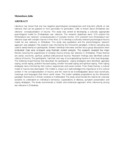Please use this identifier to cite or link to this item:
https://cris.library.msu.ac.zw//handle/11408/2844| Title: | Towards the development of an indigenous psychological trauma model for war veterans in Zimbabwe | Authors: | Mutambara, Julia | Keywords: | Indigenous psychological trauma model Post-traumatic stress disorder |
Issue Date: | 2016 | Publisher: | University of Limpopo | Abstract: | Literature has shown that war has negative psychological consequences and long-term effects on war veterans that can be passed on from generation to generation. Little is known about Zimbabwe war veterans` conceptualisation of trauma. The study was aimed at developing a culturally appropriate psychological model for Zimbabwean war veterans. The research objectives were; 1)To explore the Zimbabwean war veterans’ conceptualisation of complex trauma. 2)To establish how Zimbabwean war veterans cope with complex trauma in their lives. 3) To develop a culturally relevant psychological trauma model for war veterans in Zimbabwe. The study was qualitative and the phenomelogical research approach was adopted. The research was informed by the Afrocentric paradigm. Criterion sampling was used to select twenty-six participants. Sixteen individual interviews and two focus group discussions were conducted. Data were analysed using thematic content analysis. The research revealed five major themes covering the experiences of complex trauma among war veterans in Zimbabwe. These themes are social, economic, spiritual, political and personal trauma. Research findings also identified cultural notions of trauma. The participants` had their own way of conceptualising trauma in their local language. The following broad themes that described the participants` coping strategies were identified; appraisal coping, social coping, problem focused coping, emotion focused coping and spiritual coping. Their coping strategies were informed by their culture, experiences and social context. From these themes a cultural model of trauma was developed. The model is unique as it acknowledges the importance of the cultural context in the conceptualisation of trauma and the need to be knowledgeable about local constructs, meanings and languages that inform world views. The model validates propositions by the Afrocentric paradigm that trauma in African contexts is multifaceted. The study recommends the need to be culturally sensitive to understand an individual`s behaviour, explanations of distress, symptom presentation and coping strategies. The study recommends a holistic and contextual approach when intervening among war veterans in Zimbabwe. | URI: | http://ul.netd.ac.za/handle/10386/1549 http://hdl.handle.net/11408/2844 |
| Appears in Collections: | Thesis |
Files in This Item:
| File | Description | Size | Format | |
|---|---|---|---|---|
| mutambara abstract.pdf | Abstract | 105.27 kB | Adobe PDF |  View/Open |
Page view(s)
134
checked on Feb 26, 2025
Download(s)
30
checked on Feb 26, 2025
Google ScholarTM
Check
Items in MSUIR are protected by copyright, with all rights reserved, unless otherwise indicated.


